Sid Meier's Pirates!
Kieron Gillen's Review!
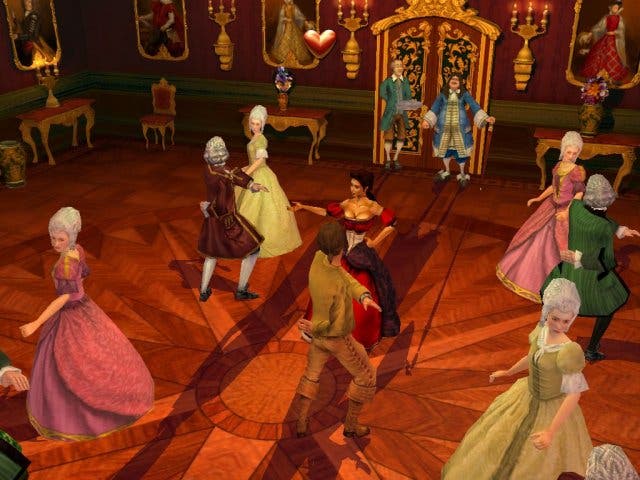
Please, God, don't make her ask me to dance.
Demand I give her a ruby ring or diamond necklace, sure. It's worth thousands of gold pieces, and my scurvy crew (trad.) will be cursing their captain's name as their pirates-retirement fund gets diverted onto the heaving bosom of a Governor's daughter, but that's much preferable than the alternative. I'm here for the buckling of innocent swash, not the integration into polite society through courtly dancing.
Pseuds could argue this was a terrible attempt to immerse you in the Pirate mindset fearful of the feminine world of domesticity, cleanliness and poncing around to something whose lyrics don't involve the precise number of men capable of fitting on some old chest, but when you're dreading the appearance of a rudimentary Rhythm Action, it doesn't quite cut the mustard.
In short, Pirates is a most curious beast.
Sequel to the legendary original, beloved of the elderly slice of the PC gaming demographic, it takes the same principle and many of the mechanics and - er - 2004s it up. You play a young pirate, given a ship, a crew and an entire world to explore. You travel from place to place, trying to exceed in pirating deeds such as collecting as much gold you can, being given ranks in the various nation's forces, the lady-kissing, finding lost kingdoms and having questionable liaisons with the cabin boy.
(One of those may be a lie.)
Essentially, think a strategy/action Elite, except on the Spanish Main.
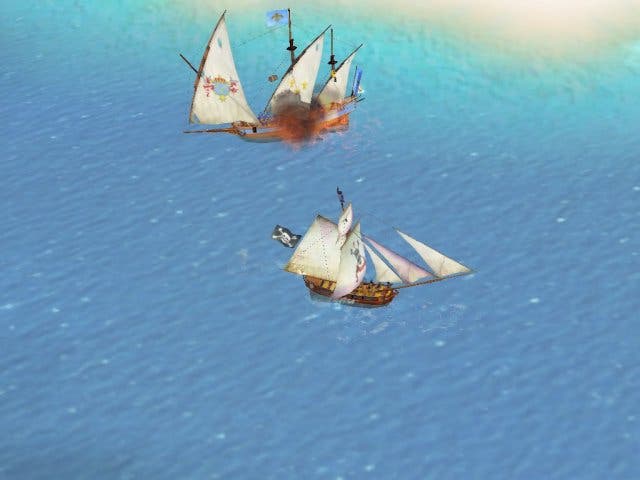
Except it's a little stranger than that. Even at its time, where baroque and imaginative game structures flourished, Pirates was something different from the norm. The best comparison would be one of the Cinemaware games (Rocket Ranger, It Came From The Desert, Three Stooges... oh, go ask your Granddad) with their multiple sub-games presented in a cinematic style, except set in a sophisticated and breathing living world.
So, to choose a hypothetical five-minute section of play, once you set sail you're viewing your ship from above, which obeys your control. Around you, other ships of all sizes and makes go about their business - delivering cargo, protecting each other, transporting troops, pirating, whatever. You spot a Trade vessel, approaching and selecting the attack button, at which point the game changes to a more action-styled sub-game about your battles. Shots are exchanges, but you decide it's time to finish it. You ram their ship, at which point you change to another sub-game, which shows the sword-fight. You win, get to choose which of its cargo to take, and then return to the main map, with - since you decided not to scuttle it - the captured ship following you. You decide to head to port, since this lesser ship is slowing you right down, and do so.
But it starts firing at you. Damn: you've been preying on Spanish vessels too much, and they've taken offence. You approach the port anyway, to discover it's barred to you. You're given the option of turning away, sneaking into the port or mounting a raid. The latter two lead to completely separate sub-games, but you decide to teach these uppity Mediterranean colonists a lesson. Winning this game, you gain access to the port and can sell to merchants, repair your ship and similar. Popping into the Governor's, you may find yourself introduced to his daughter, who then asks you to the grand ball, which leads to another sub-game...
You get the idea. Sub-games used as a device to decide whether you succeed or fail in the various pirating actions, with those results feeding back into an ongoing simulation, taking you from strapping young boy to an aged retiring sea-dog.
The original Pirates was always the strangest of Sid Meier's (And colleagues. To stress when we say "Sid Meier" we're really talking about dozens of talented people) pantheon of accepted classics, simultaneously nothing like the epic strategy of Civilization, Railroad Tycoon or Alpha Centauri while being exactly like them. The fact it's like the grandest Ocean-movie-licence ever (Ask your Granddad. He'll still be awake from last-time) with an array of mini-action games makes it completely different from main body of his lineage. You don't have to have a quick game of Dance Dance Revolution to invent the Wheel in Civ, after all.
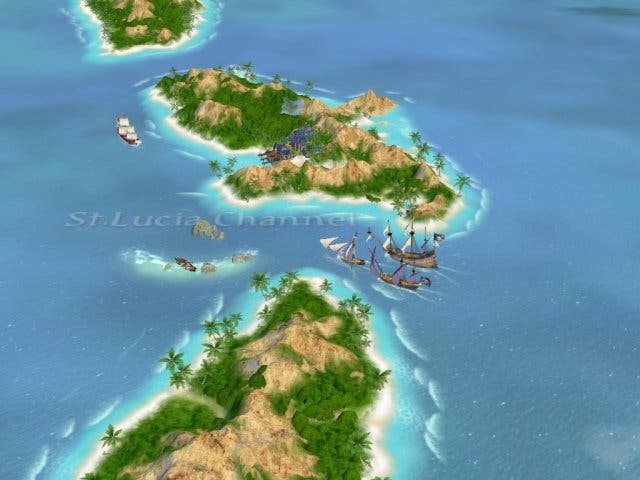
However, in the quiet, insistent compulsiveness, it's very much a Sid Meier game. They're always best personified with a gentle, relaxing pace that deceptively tricks you into playing for approximately four fifths of your natural lifespan. Everyone's got a Sid Meier addiction story at some-point in their history (Mine involves Civ 1 and a day where I didn't excrete once because I'd forgotten to). For many out there, Pirates will do the same.
Its trick is while the individual games are simple (though not all quite as simple as you initially think), the world where they're placed is vibrant and distracting enough to take your attention. At any point in the game you've got at least half-a-dozen actual quests to drag your attention towards in a concentrated way, with a constantly bubbling world to give you miniature ones. It's this mixture of long term (Can I hunt down my missing family?) and short term (I wonder how much gold is in that Galleon?) goals which sucks you in.
It's especially admirable in that it's a game that's resplendent with things to do that it never confuses complexity with depth. The individual games are all playable with the number-pad on the keyboard, and can be mostly picked up as you actually experience them for the first time, almost like a nautical Wario Ware (It also helps that when you start playing, the game's difficulty level is at the bottom rung, with the option to increase it every time you split up your treasure with your crew). The individual settlements have an array of uses, many only turning up in specific situations. You learn the game's array of foibles, mostly, from being there, and come to know when it's a good time to run to a Franciscan Monastery and when it's best to pop into a Native village or whatever.
But while pleasurable, it never crosses over into ecstasy or the deep game morphine-like mind-meld people experience with something like Civ. This is simply because the sub-games really aren't that interesting, which is - as flaws go - a fairly fundamental one.
Luckily, the ones you'll experience most are the most finely tuned. Ship-to-ship combat, for example, couldn't be simpler on the surface, with basic controls being nothing more than rotate your ship in both directions, and fire your guns. Subtlety is swiftly added with three different rounds targeting different areas of the ship, considerations about the vessels relative abilities and most importantly, the wind. It's a graceful ballet of death, and the most satisfying on an intellectual and physical level. Though it does suffer all the wind-related problems which I'll get to in a bit. Er... pretend there wasn't room for a Flatulence based gag there, please. For both our sakes.
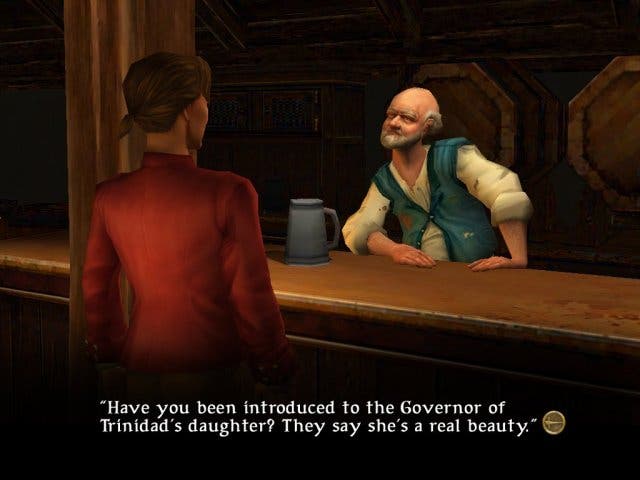
You'll play the sword-fighting, in a variety of different arenas with different twists, just as much, if not more. Mechanics are, yet again, simple: high/medium/low attacks and blocks with a taunt picking up. No real beat-'em-up complexities, with it being about noticing what your opponent is about to do, performing the counter and then choosing an attack. It's the most lavishly animated of all the sub-games - though repeated sequences pop up constantly - but not really much more complicated than what's outlined here.
The lesser-played ones prove more problematic. Neither town-raiding or the sneaking into towns will be experienced properly until you're a fair way into the game, by which point, they're actually too hard to get an easy handle on. The battle game is more successful - a simple turn-based strategy game which is clearly home ground for the Firaxis team. In fact, it's something of a shame that they didn't make more of it, as storming a town is only an option when it's hostile to you. The stealth section is a little more iffy, playing out like a tedious slow-motion Pac-man and the very model of a modern English vestigial sneaking section.
The dancing game is pure rhythm-action, with you following the directions of your dance partner. It's only really tricky for two reasons - the animation isn't always that clear and the actual buttons for the dance actions are ill-chosen. Okay: look over to the right of your keyboard. See the numpad. Well - they're 846123. Rest your fingers above them all. Note that you can't. This alone leads to more stumbles on the dancefloor than there really should be. Luckily, this event also is about seducing girls, so we can't be that down on it [Are you sure? -Germaine Greer].
The last sub-game of note is the hunting-for-treasure mode, which provides a more intellectual break from the game. Collecting pieces of map eventually reveals enough clues for you to work out where to disembark and follow the landmarks to the buried booty.
Booty's an interesting one in Pirates too. While the whole lifetime career mode - with you accumulating land, riches and reputation - is exquisitely done, the variable attention does bewilder. You'll find yourself maxing out whatever ship you choose relatively quickly in the game, probably by just capturing one of the better ones from a rival pirate, then only improve through gathering the equivalent of magic items (Pistols to improve your duelling, etc). While you can see why the game design decisions were made (As losing a ship would otherwise be a catastrophic event for a player, requiring a reload), it still leads to a curious atmosphere where you're more interested in gaining a telescope rather than galleon.
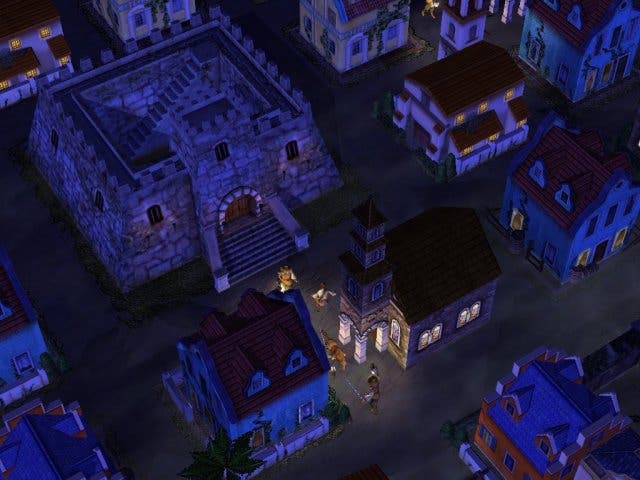
While the repetitive nature of the sub-games is what really keeps this away from true greatness, what leads to an increasing sense of the game being a chore is something as simple and ethereal as a wind. Pirates stresses the importance of wind direction, with your vessel responding pseudo-realistically to it (i.e. tacking at angles a better idea that directly going against its direction). However, due to the generally west-blowing winds across the games' setting, this makes travelling eastwards far more tedious than it should be. This particularly grates when having won a naval battle by bringing down the masts, immobilising your prey, you have to struggle against the wind for a couple of minutes to actually board the vessel. Pirates only really works when it's frothy and fun as its presentation - it's a very "light" boys-own pirate-world - and these occasional interjections of tedium are a shame. The wind is simultaneously the biggest strategic influence on your decisions, and the thing which most makes you consider reaching for the quit button when you realise you want to travel the entire length of the Caribbean against a headwind.
Don't reject it out of hand, however. It's a charming game, full of detail, with an old-fashioned deep design. It's still as unique as the day it was conceived in terms of marrying an action front end with a bubbling simulation world to explore. Its execution of an open-ended exploratory world as fine as anything you'll see in gaming - probably including most MMOs. There's certainly people reading this who'll find themselves press-ganged into service, only to fall in love with the life and end up as the next Virtual-Blackbeard sailing the PCeas.
A rum old game. And even when it walks the plank, it walks it with style.


